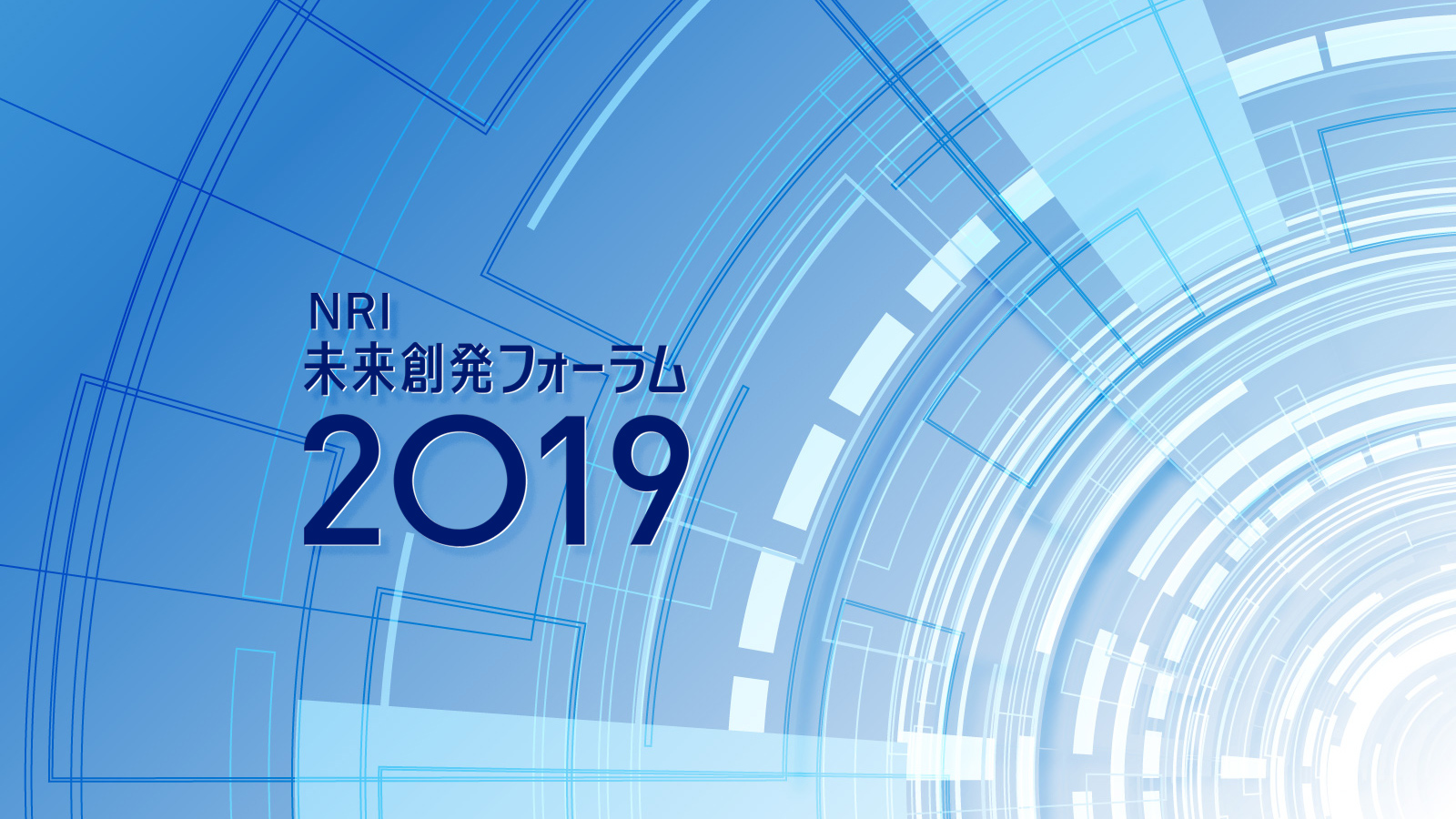
Japan’s Future Path in the Digital Transformation Era
A panel discussion on the theme of "Japan’s Future Path in the Digital Transformation Era" was held at the Dream up the Future Forum 2019, hosted by Nomura Research Institute (NRI).
The panelists were three experts who are familiar with the latest developments of digital transformation in different fields such as regional strategy, social infrastructure, cutting edge technology and business, and manufacturing.
Before the panel discussion, we asked them about the current status of digital transformation (DX) in each field, its challenges, and possible solutions.

Manufacturing industry where managers still have a conventional approach to DX
Japanese companies are becoming increasingly involved in DX. Mia Matsuo, a consultant specializing in the manufacturing industry, talks about the current state of DX in the manufacturing industry and cautions managers as follows:
"While the Japanese manufacturing industry is steadily implementing strategies and investments to maintain its current business model, there are many managers who do not take specific measures if disruptive *1 trends emerge in their own business, but merely say that they know, they are listening, and they are thinking."
"For example, when we talk about possible disruptive changes that may occur in the current business, young and mid-level employees see them as their concerns and feel strongly about their company not doing anything about them. However, senior employees or managers who have significant decision-making authority do not see the risk to the company as their problem. It is necessary to raise the issue with these managers and change the way we think about how to become a disruptive organization."
Importance of public understanding of national and regional digitalization
Fumihiko Kamio, who has been involved in projects such as urban and regional strategies, social infrastructure strategies, and also served as a committee member at the Cabinet Secretariat’s Future Technologies × Regional Revitalization Review Committee, said, "Japan has yet to specify its targets for digitalization."
"The Ministry of Internal Affairs and Communications, the Ministry of Economy, Trade and Industry, the Cabinet Secretariat, and other organizations are discussing how to promote IoT (internet of things) and DX for national and regional development. While the government must promote measures for digitalization, digitalization of the entire country’s systems requires a clearer perspective."
"It is important to clarify how digitalization will benefit citizens and enhance the competitiveness of the nation. It can be said that the present situation is ‘digitalization without a roadmap’, as it is difficult to see how digitalization will improve the productivity and quality of life of society as a whole”.
An increasing sense of urgency about DX in Japanese companies due to external pressure
Makoto Shirota, an expert on advanced technologies and businesses who predicts and analyzes their impact on society and business, talks about the trends he sees across industries and technologies as follows.
"We are following what global IT companies like GAFA are trying to do by using digital technology. For instance, Amazon has had a great influence on the distribution and retail industry in Japan. The recent introduction of Amazon Go stores, where customers can purchase products without waiting in line for payment, attracted widespread interest. Some Japanese companies are also talking about implementing the same."
"However, as Amazon Go has changed the shopping experience for consumers significantly, rather than implementing digitalization just to compete with Amazon, the best way to go about it would be to first approach it in a customer-focused way. Digitalization is after all just a means, not the goal.”
How to generate the capability to promote digitalization?
A key issue in promoting DX is the availability of human resources and systems to support it.
Matsuo says, "Every company is worried to some extent."
"Some companies are starting to work on DX with a new organization, while others are starting by changing the mindset of employees within the company, with top managers themselves becoming project leaders and hiring directors from outside. I don't think many companies can say that they are adapting well to DX."
Shirota adds, “Digitalization will not work well if companies follow the conventional approach of imitating large companies.".
"Since there are few Japanese companies that have sufficient human resources with the skills to support DX, it is necessary to think of ways to attract people from outside. Moreover, major changes will not take place unless 」new approaches are taken, such as giving greater discretion and changing the evaluation and remuneration systems."
Kamio says that to promote regional digitalization, "it is important to collect data that connects industry, academia, government, and the private sector”.
"While talking about human resources, regional areas also need leaders. Although there are some municipalities where the leaders themselves are working earnestly for digitalization, there are concerns that if the leader is replaced for some reason (such as the end of his/her service term), the effort put into these initiatives may decline. Successful digitalization depends on constructing and accumulating data that has value among the citizens through the collaboration of the core human resources of the government, academia, and industrial sectors. Cities and regions creating such data infrastructure are limited by such "restrictions" or "hurdles", and at this forum, we hope to share some cutting-edge examples of how to overcome them."
Understanding and flexible approach required for DX
Matsuo points out, "In some cases, the Japanese manufacturing industry does not know how customers use their products."
“A typical company in the Japanese manufacturing industry has yet to develop ideas of DX strategy. For instance, they would not have reached the stage of thinking about how to make use of customers’ usage data for further business development."
She further continues:
"If the top management has a sense of urgency about digitalization, it is important that they take responsibility for the project and work with young and mid-level employees to move things around. I think it is necessary to move forward while taking responsibility and promptly working on a more appropriate system, promotion method, and external partnerships, while skillfully using outside help in the project management office.”
Shirota suggests that management should reconsider how they view IT:
"In many Japanese companies, IT has been treated as 'cost' until now. However, it is time to change its status to ‘growth engine’. I would like to introduce the specific examples in the forum based on the idea that the effective use of digital technologies such as AI, robots, IoT, and 5G will lead to the creation of new services and improvement in employee productivity."
Kamio concluded by saying, "It is important to respond to technological changes flexibly". “Since it is impossible to carry out digitalization throughout the country all at once, it is better to first create a prototype at a regional level and then connect it from region to region. It is also necessary to take a bold stance while adapting to the constantly transforming technology. In the forum I would like to introduce some leading-edge examples from cities around the globe, and then present my examples of digitalization at the compact city-level that is both reliable and crisis management-ready."
Message from Maoko Kotani, the panel discussion moderator

I have been involved in discussions related to "Digital Opening in the Near Future" (for three consecutive years) since the NRI Dream Up the Future Forum was first held in 2017.
As the culmination of these efforts, we have adopted the "Recommendations for Digitalization of Society and Industries" this year.
In the panel discussion moderated by me, I would like to share an idea of what we would like to create in the future through digitalization, together with three experts from NRI specializing in public policy, management strategy in the manufacturing industry, and cutting-edge technologies and business trends.
I am very much looking forward to the event as it is a worthy compilation of 3 years’ series.
-
*1 Disruptive:
Innovations that break existing values and norms, and create new markets and values
Profile
-
Fumihiko Kamio
-
Makoto Shirota
-
Mia Matsuo
* Organization names and job titles may differ from the current version.